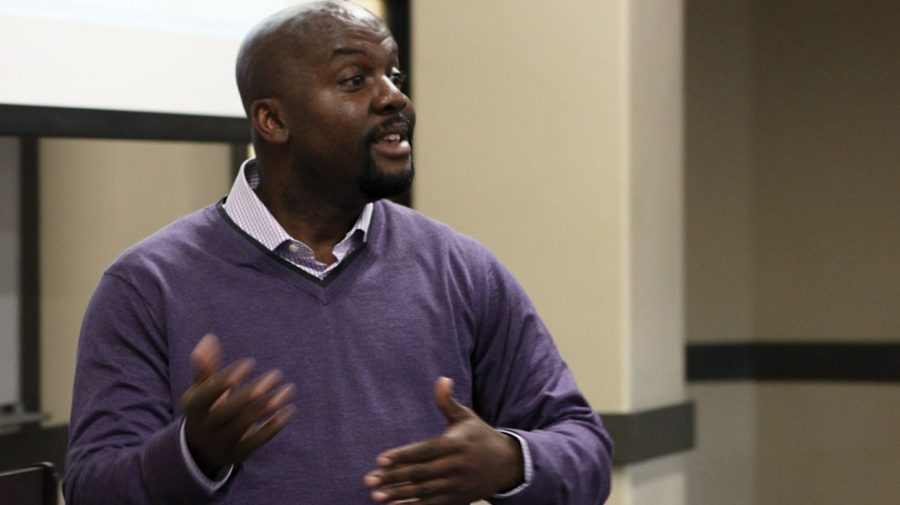Norton AntiVirus released a study in January saying cyber crimes currently generate five times more money than global drug trafficking.
The former “No. 1 Hacker in the World,” Gregory Evans, told a group of UA students and faculty on Tuesday that he knows what it’s like to be a millionaire.
“In 1993, I had my first 12-passenger jet,” Evans said. “I had the Rolls-Royces and Bentleys, and I didn’t even have to kill anyone.”
Computer hacking and identity theft are the new wild, wild, West according to Evans, because he said it is so difficult to get caught.
“In old cowboy movies, guys with bandanas over their faces would go in and rob a bank and then jump onto a horse and ride off into the sunset,” Evans said. “They just didn’t get caught unless they built up a big posse or reputation.”
Only one out of 10,000 cyber crimes actually leads to an arrest, he said. Evans attributes this to lack of hacking expertise in the United States.
“The reason why we are getting our butts kicked by China every day in the cyber war is because they are training their high school students to hack into Google while we are relying on Information Technology managers,” Evans said.
He explained that three men were able to steal 40 million credit cards from T.J. Maxx/Marshall’s and charge $200 million and remain undetected for a year and a half by the company’s IT staff.
“IT managers are not trained to think like hackers,” Evans said. “They are good for helping you set up your e-mail and running anti-virus software.”
Wesley Buchanan, a junior majoring in criminal justice who wants to become a state trooper, said he didn’t know aboutall the complications that occurred.
“I didn’t know a lot of these problems existed,” Buchanan said. “The industry is so open, and I’m almost tempted to go into it myself.”
Evans began his personal hacking career in the seventh grade when he was paid to sneak into his middle school at night to change other students’ report card grades.
When one of his classmates’ fathers found out that Evans had altered his son’s grades, the Washington D.C. lobbyist hired Evans to hack into the computer system of a rival law firm.
“I went dumpster diving that night and went through the trash looking for user names and passwords,” Evans said. “I gave him exactly what he was looking for, two weeks later, and he hired me for more and more jobs.”
Before he graduated from high school, Evans had become a key player for many major corporations and was bringing in more money a week than many athletes and entertainers see in a year.
He was eventually apprehended, sent to prison for 24 months and forced to pay back $10 million. Now, he is CEO of National Cyber Security and CEO of LIGATT Security International and speaks to audiences all over the country on how to protect themselves against cyber crimes.
“It’s astounding to me, from a criminal justice perspective, how computer crime fighting is still in its infancy,” said Mark M. Lanier, professor and chair of the department of criminal justice. “What better resource could you have to help combat this crime than someone who has spent most of his life on the other side of the law?”
Evans said he currently has requests for help from thousands of people all over the world.
“The biggest percentage we see is when some guy with a little bit of game convinces a girl to send a picture or video of herself to him over text message,” Evans said.
He said that the word “textortion” was coined to describe what happens when the person who originally received the picture or video begins extorting the sender, via blackmail.
“Law enforcement isn’t going to do anything for you,” Evans said. “We are the only ones who are doing it.”
10 Ways to Protect Yourself from Computer Hacking/Identity Theft
All Information Said in His Lecture
- Change your passwords frequently and do not use the same user name and password for multiple websites
- Changing some of the letters to numbers in a password makes it virtually impossible for someone to get into, and it remains easy to remember. ex: Doggie becomes D066ie
- Before you put your username and password into a website go to AMIHACKERPROOF.com
- Never open up a PDF file in an e-mail unless you are expecting to receive it and know where it came from
- Do not use the CC line of an e-mail to send a message to multiple recipients. Instead, use the BC line.
- Do not forward e-mails that say “If you love God, please forward to 10 people and send it back to the person who sent it to you.” God does not communicate via e-mail.
- Don’t put all of your personal information on Facebook, Myspace, or Twitter. Statuses that say you are leaving town for vacation can be a bad idea too
- Password-protect your voicemail on your cell phone. There are ways for people to listen to all of your messages through Evans’ caller-ID website spoofem.com
- Install some true anti-spyware on your machine, and do not rely on anti-virus software alone.
10. Be observant. Your mouse will not begin squeaking like a real mouse if you are being hacked and your keyboard will not begin typing by itself. If pictures appear on the Internet that you know nobody else had access to or things begin showing up on your credit report you should investigate.







